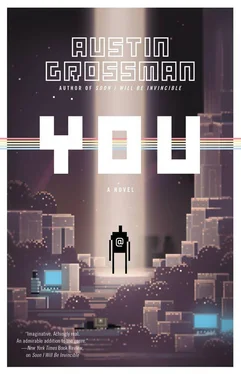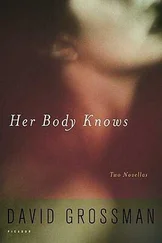He leaned forward and put out his hand and I shook it by reflex, and that was our good-bye. All I could think was the profoundly unprofessional thought: Thank God. I’m in the club now.
I left and went to the kitchen and shouldered through the fire door to the loading dock. I didn’t have an office so there was nowhere else for me to go if I needed to be alone for a moment. It was raining but not for real, just enough to speckle the warm sidewalk.
I walked a little ways across the parking lot, feeling the unfamiliar midday brightness through the clouds, the warmth and smell after half a day indoors. It was just after one o’clock on a Monday, and Arlington Avenue was jammed. The land around Cambridge and Somerville gave off a peculiarly exhausted feeling, feeble wetlands mingled with land that had been built on and paved and rebuilt on since colonial times.
I shook my head and walked down to the Mobil station. I went there a lot for Skittles and raspberry Snapple, both of which I could perfectly well get from the office kitchen but I liked the walk, and I liked the smell of gasoline.
I went to badge back in but I’d left my security card on my desk, so I just stood there until one of the workers from one of the other offices—blue shirt, tie, ex-jock demeanor—opened the door for me. Everyone recognized the Black Arts guys; we’re the middle-class adults wearing T-shirts. Sometimes I felt superior to the people in the other offices—I make dragons, what the hell do you make?—and sometimes I felt like a loser.
Inside, everyone was recovering from the news and there was a feeling of mixed panic and relief fizzing on top of the usual post-shipping daze. It looked like nobody knew about my promotion yet. Don sent out a “don’t panic” e-mail to say things were being handled, then a private one to me saying he was holding off on a formal announcement until Tuesday morning.
Darren was the lead writer and designer, the force that had held several successive Black Arts products together, the animating creative voice of the product line. Darren was Black Arts. From what I understood, he also held regular temper tantrums and blamed anything and everything possible on the programming staff. He was a relentless micromanager, mitigated only slightly by the fact that he was right 98 percent of the time. He and Simon had been the rock stars of Black Arts Studios, and after that Darren held that post alone. Depending on how you looked at it, Darren was our Mick Jagger (designated swaggering extrovert) to Simon’s Keith Richards (quietly virtuosic, blatantly self-destructive). Or else Darren had been Paul McCartney (chirpily commercial) and Simon had been John Lennon (moody, introspective, possessed of quasi-mystical insights).
Darren/Paul/Mick had left, and Simon/Keith/John was long gone, and I, hypothetically a backup singer or maybe just the guy who shakes a tambourine at the side of the stage, was in his place. A few other designers were in a huddle around one of their desks—including Peter and Jared, who graduated from Harvard together three or four years ago. I could tell they were talking about who would step up as lead designer. It made sense that it would be one of them, especially Jared, who had taken point on revamping the combat system and tools chain in the last cycle.
They were going to be surprised on Tuesday. Well, let Don explain it to them. Nothing else was going to happen today. I wondered why I wasn’t more panicked, but also I knew I had a right to this.
I had been handed it back on a platter, a second chance to be Simon. I thought of Brennan and his lost inheritance, and the crown of the true king lying at the bottom of a cave somewhere in the world, just waiting to be picked up.
A great deal of Realms of Gold RPG was going to come from me. This was so terrifying as to make it almost impossible to sit in my own chair. I wrote in my notebook the things I knew so far:
Place: Endoria.
I was slowly finding out more about that.
Time: The end of the Third Age.
Genre: Fantasy Role-Playing Game.
That was the hard part. It was going to be told in the weird format known as the computer fantasy role-playing game, a literary form that did not exist until about 1970 but had already become as strictly formalized as Kabuki.
I didn’t know the genre especially well, but I did know enough to realize that it was an almost unbearably dorky storytelling form that was, roughly, a series of jury-rigged, slowly evolving attempts to marry the feeling of storytelling to the feeling of controlling a character.
I understood what its creators were trying to do, but their games didn’t do it for me, at least not that way. The computer wasn’t a human storyteller; it couldn’t respond if I talked back to it. Little Red Riding Hood was a good story, but it wasn’t interactive. Sooner or later I wanted to say “no, I may be Red Riding Hood but I don’t care about my grandmother; what I want is heroin and only heroin,” whereas the game had only “over the river and through the woods” to offer me. Which was a good story, it just might not be mine.
I still wanted adventure. I wanted to see places untouched by human hands. I wanted to make mistakes and learn from them; I wanted to fight battles I knew weren’t rigged. The longer I worked at Black Arts the more I felt like it had to be possible.
I was going to bump up against the same problems Simon and Darren had. I was going to go to war against the same forces they had. I had to learn their tricks. And I had to see their mistakes.
I hadn’t seen the Heroes for a while, so it was a surprise when Brennan showed up on his own that night. It made sense that it would be Brennan, as he was always the default character choice. He had the distinction of being, typologically, the hero.
Brennan, of the House of Aerion
Strength: High
Reflexes: Medium
Intelligence: Medium
Endurance: High
Special ability: Can wield dual weapons at no penalty
Goal: Restore the true king
“Hey there, Brennan.”
“Forward against the dark!” he said. This was one of the recorded phrases he’d say when anything interesting happened during games. His utterances were written to be vague enough to fit various situations, which meant in any given specific situation they sounded slightly nonsensical.
“Uh-huh.”
“By the honor of my house!” he cried.
“Yup.”
In person he was a little more funny-looking than handsome. He had plump cheeks, and his head seemed slightly small for his enormous, muscled body. He was big and round-shouldered rather than classically proportioned. He had a battered wooden shield, spattered with flecks of red paint and adorned with a faded yellow griffin crest, strapped to his back.
“Forward against the dark!”
There must have been someplace else to take this conversation, but I couldn’t think of it.
“For the quest!” he said. It came out with a slightly interrogative lilt.
“I don’t have a quest, exactly. I’m trying to figure out how to make better video games.”
“Aye. Seek the prize that was stolen!”
“It wasn’t really stolen, though. More like it’s been left lying around, and if I’m lucky I might find it.”
“Aye.” He sounded a little less certain.
“Why, what do you do all day?”
“Forward against the dark! For the quest! That sort of thing, you know. I pick up gold pieces that I find in chests.”
“And that makes you feel satisfied?”
“Long ago I had a backstory. It’s written in the manual but nobody reads it. My father stood against the false king, but we were beaten. If only we had found the king’s crown—the crown of the true king. The Crown of Winter! Simon knew about this.” He sighed. He seemed as disappointed as his inflexible features would allow. He wasn’t designed to look very sad.
Читать дальше





![Ally Carter - [Gallagher Girls 01] I'd Tell You I Love You But Then I'd Have to Kill You](/books/262179/ally-carter-gallagher-girls-01-i-d-tell-you-i-lo-thumb.webp)






